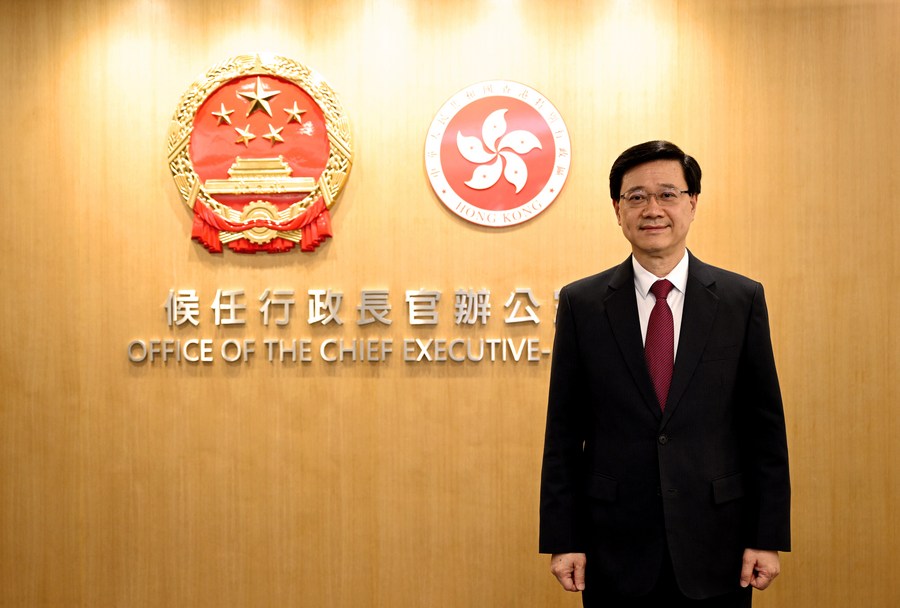Incoming HKSAR chief executive John Lee vows to build caring, inclusive Hong Kong
 0 Comment(s)
0 Comment(s) Print
Print E-mail Xinhua, June 22, 2022
E-mail Xinhua, June 22, 2022

John Lee, the incoming sixth-term chief executive of the Hong Kong Special Administrative Region (HKSAR), has pledged to build a caring and inclusive Hong Kong that boasts diversified development under his leadership.
"The next five years will be crucial for Hong Kong as the city's order has been restored and it is advancing toward prosperity, and I will spare no effort to promote Hong Kong's development," Lee said in an interview with Xinhua.
Reviving economy, improving livelihood
Lee, who won the HKSAR's sixth-term chief executive election on May 8 with an overwhelming majority, will assume office on July 1, the 25th anniversary of Hong Kong's return to the motherland.
Over the next five years, the HKSAR government will focus on economy and people's livelihood, trying to solve the problems accumulated over the past years, while remaining vigilant about safeguarding national sovereignty, security and development interests, Lee said.
Integrating into national development
Over the past 25 years, Hong Kong has weathered challenges including the Asian financial crisis, the SARS epidemic and the international financial crisis, and consolidated its status as an international financial, shipping and trade center.
Lee deemed the country's support as Hong Kong's most important strength for overcoming challenges and initiating new chapters of progress.
Noting that Hong Kong serves as an effective bridge between the mainland and the rest of the world, he said the city's unique advantages should be leveraged to contribute to the development of the country.
According to the 14th Five-Year Plan (2021-2025) for National Economic and Social Development, Hong Kong is being supported in establishing itself as an international center for innovation and technology, a center in the Asia-Pacific region for international legal and dispute resolution services, a regional center for intellectual property trade, and a center for cultural and art exchanges with other countries.
Hong Kong should give full play to its own advantages, enhance its international competitiveness, and better integrate into the country's overall development, Lee said.
He also said that it is the HKSAR's constitutional responsibility to achieve the Article 23 legislation under the HKSAR Basic Law.
"We will do a full legal study to ensure that local legislation can handle the national security risks that may be encountered in the future," he said.
Reflecting on the practice of "one country, two systems" in Hong Kong, Lee said he believes that over the past 25 years, the principle has been successfully implemented, albeit not without weathering some storms, "but Hong Kong became more resilient and dynamic after overcoming each of the challenges."
"We need to further improve the overall development of Hong Kong and heighten its international reputation to make the city more successful," Lee said. "This is the key objective of promoting the 'one country, two systems.'"
"We need to lay a solid foundation in the next five years, so that we can further develop without worry after that," he said, vowing to address deep-rooted problems, including housing and youth development during his term.
The newly appointed chief executive stressed on multiple occasions that he would handle problems with a results-oriented approach, and said he intends to ensure there is a good risk management system to deal with any potential crises that may threaten Hong Kong.
"From my point of view, development is the key to solving problems in Hong Kong," Lee said, adding that the focus of the new HKSAR administration is to promote development to benefit Hong Kong residents, so that the issues long plaguing the Hong Kong society will be gradually solved.
Supporting younger generation
Lee's political manifesto promises to formulate a comprehensive youth policy and youth development blueprint to aid their upward mobility.
The initiatives include vocational training, employment opportunities and start-up support for young entrepreneurs; encouraging the younger generation to serve on government advisory and statutory bodies; and supporting Hong Kong youths in gaining employment and entrepreneurship opportunities in the mainland.
Lee emphasized the importance of youth employment and encouraged the younger generation to seek job opportunities in the Guangdong-Hong Kong-Macao Greater Bay Area.
He expressed hope that the younger generation will take pride in their country and Hong Kong, and share their stories with the rest of the world.
"It is important that we let our youths understand more about our history," said Lee, "at the same time, they know the difficulties and hardship that the country went through."
When the country makes remarkable advances, the young people in Hong Kong also share the pride and joy, said Lee, citing the recent success of the Shenzhou-14 crewed space mission, and the contributions of Hong Kong universities to the country's space programs.
"This participation and togetherness make them part of the story," Lee said.






Go to Forum >>0 Comment(s)